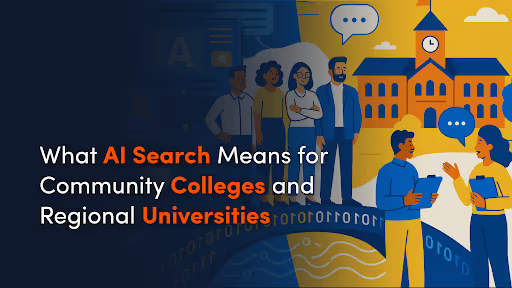About the Blog
Once upon a time, search was simple. A prospective student typed “best colleges for psychology” into Google and saw a list of familiar names. Big names. Brand names. It wasn’t exactly a fair fight.
But the game is changing fast.
Thanks to AI-powered search tools like Google’s Search Generative Experience (SGE), ChatGPT, and Perplexity, how students explore their options is being rewritten in real time. These tools don’t just crawl the web — they synthesize, summarize, and recommend. They answer questions like:
- What are affordable colleges with strong support for first-gen students?
- Which schools are good for creative writing and study abroad?
- What’s the best school in the Midwest for a student who wants to major in business but also loves theater?
Suddenly, it’s not just about who can buy the most ads or whose name students recognize. It’s about who has the most helpful, relevant, and clear information online.
And that’s where smaller schools have a real shot.
Why This Matters (Right Now)
AI search engines don’t care about your football team. They don’t care how many buildings you have or where you sit in national rankings. They care about content. They care about clarity. They care about context.
If your school has a strong honors program, but it’s buried three clicks deep behind a PDF, you’re invisible. If your student support services are amazing, but your site never actually says how they help students day to day, AI tools won’t mention you.
But if you can answer real student questions in language they understand — if you can surface the right programs, the right outcomes, and the right stories — AI search will take notice. And it just might start putting your name next to the giants.
The “Wake-Up Call” List
Here are five simple but powerful reminders to help smaller schools make the most of this moment:
1. Be Findable Before You’re Famous
You don’t need name recognition. You need answer recognition. Start by writing the answers to questions your prospective students are really asking — and make those answers easy to find.
2. Focus on What You’re For
Generic doesn’t get you mentioned. Be specific. Be proud of what makes your school unique — whether that’s your student-faculty ratio, your mentorship programs, or your quirky traditions.
3. Write Like a Human, Be Seen by AI
Forget the buzzwords. Say what you do, who it’s for, and why it matters — in plain language. The clearer your site is, the more AI tools can pull from it.
4. Tell the Full Story
Don’t just list majors. Show how those programs lead to careers, internships, community impact. AI loves connections — so make them easy to see.
5. Iterate Often
AI search is evolving weekly. Don’t “set and forget” your content. Keep updating, testing, and improving how you show up.
The Bottom Line
AI search is no longer the future — it’s here. And while it may feel like one more thing to figure out, it’s also a powerful opportunity. For schools willing to adapt, it’s a chance to be seen, heard, and considered in ways that weren’t possible before.
Smaller schools don’t need to shout louder. They just need to say something worth hearing.
And now, for the first time, AI is listening.










